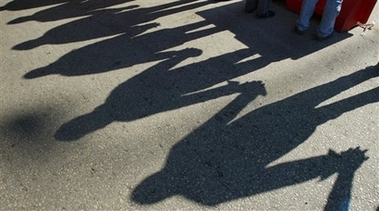 Beirut, Jan 14 (DPA) The slogan ‘I love life’ is currently covering billboards around the Lebanese capital as the government and the opposition compete over who loves life and Lebanon more. It is a campaign used by the March 14 Coalition and has been countered by slogans from the opposition that read: ‘We love life without debt or outside interferences.’The billboards represent the competition between Lebanon’s government and its allies, and the opposition to show their love for Lebanon.’We love life with pride,’ reads a billboard for the Lebanese Shia movement Hezbollah. A few metres away, a large billboard pasted up by the forces that support the government of Premier Fouad Seniora says: ‘We want to live. We love life.’
Beirut, Jan 14 (DPA) The slogan ‘I love life’ is currently covering billboards around the Lebanese capital as the government and the opposition compete over who loves life and Lebanon more. It is a campaign used by the March 14 Coalition and has been countered by slogans from the opposition that read: ‘We love life without debt or outside interferences.’The billboards represent the competition between Lebanon’s government and its allies, and the opposition to show their love for Lebanon.’We love life with pride,’ reads a billboard for the Lebanese Shia movement Hezbollah. A few metres away, a large billboard pasted up by the forces that support the government of Premier Fouad Seniora says: ‘We want to live. We love life.’
Since Christmas, red-and-white posters were pasted up around Beirut proclaiming ‘I love life’ in Arabic, English and French in an apparent reaction to Hezbollah’s culture of martyrdom. ‘There is a group in Lebanon who advocate death and love war and they put the idea of military confrontation above any other consideration,’ said a follower of the government. ‘We are telling them not all the Lebanese back your views and we love to live.’ Said Hezbollah’s Zuheir Safieddine: ‘This is silly. The government forces think only they love Lebanon and they love life, but we tell them we love Lebanon to be free from political, social, financial debt.’Opposition follower George Aoun remarked: ‘We tell them (the government forces) that advertising never bought the trust of the people. Go invest in building constitutions and show goodwill in boosting the economic cycle.’
However, the billboards have angered some Lebanese who consider themselves neutral in the political crisis dividing the country. They criticise both sides for pulling the country into civil strife. One such critic is Najwa Baydoun, a Lebanese social worker.’Who are they (opposition and government forces) kidding? Human minds can be limited and blind sometimes, but they should not use the word ‘love’ in their political war,’ said Baydoun.
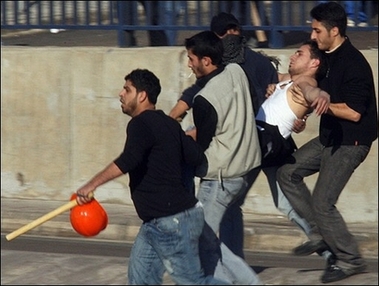 BEIRUT (Reuters) JAN 25 – The death toll in clashes between government loyalists and opposition followers at a Beirut University on Thursday rose to four, an opposition-run television station reported. NBN said two of the dead were students loyal to the opposition, which includes the Shi’ite Muslim Hezbollah and Amal.
BEIRUT (Reuters) JAN 25 – The death toll in clashes between government loyalists and opposition followers at a Beirut University on Thursday rose to four, an opposition-run television station reported. NBN said two of the dead were students loyal to the opposition, which includes the Shi’ite Muslim Hezbollah and Amal.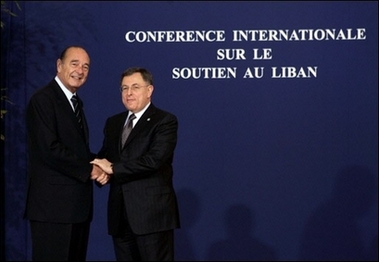 Saudi Arabia, the United States, France, EU and other international donors pledged more than 7.6 billion dollars in aid to Lebanon to support the government. The pledges were made Thursday during a one-day international donors’ conference held in Paris. In his opening speech, Lebanese Prime Minister Fouad Siniora thanked the participants from some 40 countries for their support, and appealed to foreign donors for further financial support, which he said was vital for Lebanon
Saudi Arabia, the United States, France, EU and other international donors pledged more than 7.6 billion dollars in aid to Lebanon to support the government. The pledges were made Thursday during a one-day international donors’ conference held in Paris. In his opening speech, Lebanese Prime Minister Fouad Siniora thanked the participants from some 40 countries for their support, and appealed to foreign donors for further financial support, which he said was vital for Lebanon
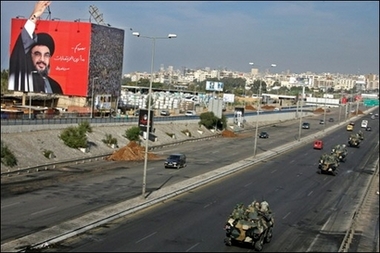 BEIRUT (AFP) JAN 24 – Calm returned to Lebanon as roads were cleared and Beirut airport reopened after the opposition called off a general strike that sparked deadly street fights ahead of a donor conference in Paris. Traffic moved freely Wednesday after tractors and cleaners worked all night to clear tyres, sand and rubble from streets blocked in an opposition show of force on Tuesday aimed at ousting the Western-backed government.
BEIRUT (AFP) JAN 24 – Calm returned to Lebanon as roads were cleared and Beirut airport reopened after the opposition called off a general strike that sparked deadly street fights ahead of a donor conference in Paris. Traffic moved freely Wednesday after tractors and cleaners worked all night to clear tyres, sand and rubble from streets blocked in an opposition show of force on Tuesday aimed at ousting the Western-backed government.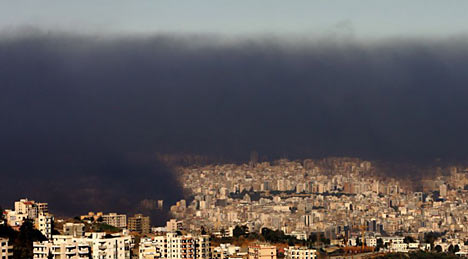 Jan 24, Life was returning to normal in the Lebanese capital and around the country Wednesday, a day after violent confrontation between government supporters and opponents killed three people and wounded dozens. The violence was the worst escalation of the opposition’s campaign to topple Prime Minister Fuad Saniora’s Cabinet.
Jan 24, Life was returning to normal in the Lebanese capital and around the country Wednesday, a day after violent confrontation between government supporters and opponents killed three people and wounded dozens. The violence was the worst escalation of the opposition’s campaign to topple Prime Minister Fuad Saniora’s Cabinet. 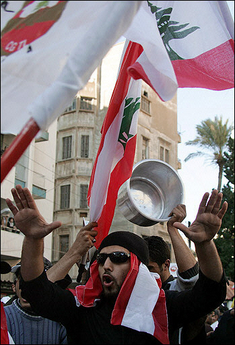 By Tom Perry BEIRUT, Jan 23 (Reuters) – Lebanon’s opposition called on workers to go on strike on Tuesday in an escalation of its campaign against the government that is set to deepen the political crisis in the country. Hezbollah leader Sayyed Hassan Nasrallah, part of the opposition, called on Lebanese to observe the strike and be ready for more steps which the opposition might announce to press its demands for veto power in cabinet and new elections. Prime Minister Fouad Siniora’s has shrugged off the demands, instead preparing for an international aid conference in Paris on Thursday that it hopes will yield billions of dollars for Lebanon’s debt-laden economy.
By Tom Perry BEIRUT, Jan 23 (Reuters) – Lebanon’s opposition called on workers to go on strike on Tuesday in an escalation of its campaign against the government that is set to deepen the political crisis in the country. Hezbollah leader Sayyed Hassan Nasrallah, part of the opposition, called on Lebanese to observe the strike and be ready for more steps which the opposition might announce to press its demands for veto power in cabinet and new elections. Prime Minister Fouad Siniora’s has shrugged off the demands, instead preparing for an international aid conference in Paris on Thursday that it hopes will yield billions of dollars for Lebanon’s debt-laden economy.  Beirut, Jan 14 (DPA) The slogan ‘I love life’ is currently covering billboards around the Lebanese capital as the government and the opposition compete over who loves life and Lebanon more. It is a campaign used by the March 14 Coalition and has been countered by slogans from the opposition that read: ‘We love life without debt or outside interferences.’The billboards represent the competition between Lebanon’s government and its allies, and the opposition to show their love for Lebanon.’We love life with pride,’ reads a billboard for the Lebanese Shia movement Hezbollah. A few metres away, a large billboard pasted up by the forces that support the government of Premier Fouad Seniora says: ‘We want to live. We love life.’
Beirut, Jan 14 (DPA) The slogan ‘I love life’ is currently covering billboards around the Lebanese capital as the government and the opposition compete over who loves life and Lebanon more. It is a campaign used by the March 14 Coalition and has been countered by slogans from the opposition that read: ‘We love life without debt or outside interferences.’The billboards represent the competition between Lebanon’s government and its allies, and the opposition to show their love for Lebanon.’We love life with pride,’ reads a billboard for the Lebanese Shia movement Hezbollah. A few metres away, a large billboard pasted up by the forces that support the government of Premier Fouad Seniora says: ‘We want to live. We love life.’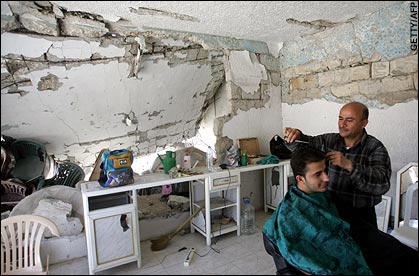 By Michael Hirst in Beirut, Sunday Telegraph, Talking politics is normally a favourite pastime in Lebanon. But after a summer of war and an autumn of government in deadlock, Beirut’s shops, cafes and barbers have drawn a line under the heated national dialogue by banning all talk of current affairs on their premises
By Michael Hirst in Beirut, Sunday Telegraph, Talking politics is normally a favourite pastime in Lebanon. But after a summer of war and an autumn of government in deadlock, Beirut’s shops, cafes and barbers have drawn a line under the heated national dialogue by banning all talk of current affairs on their premises


